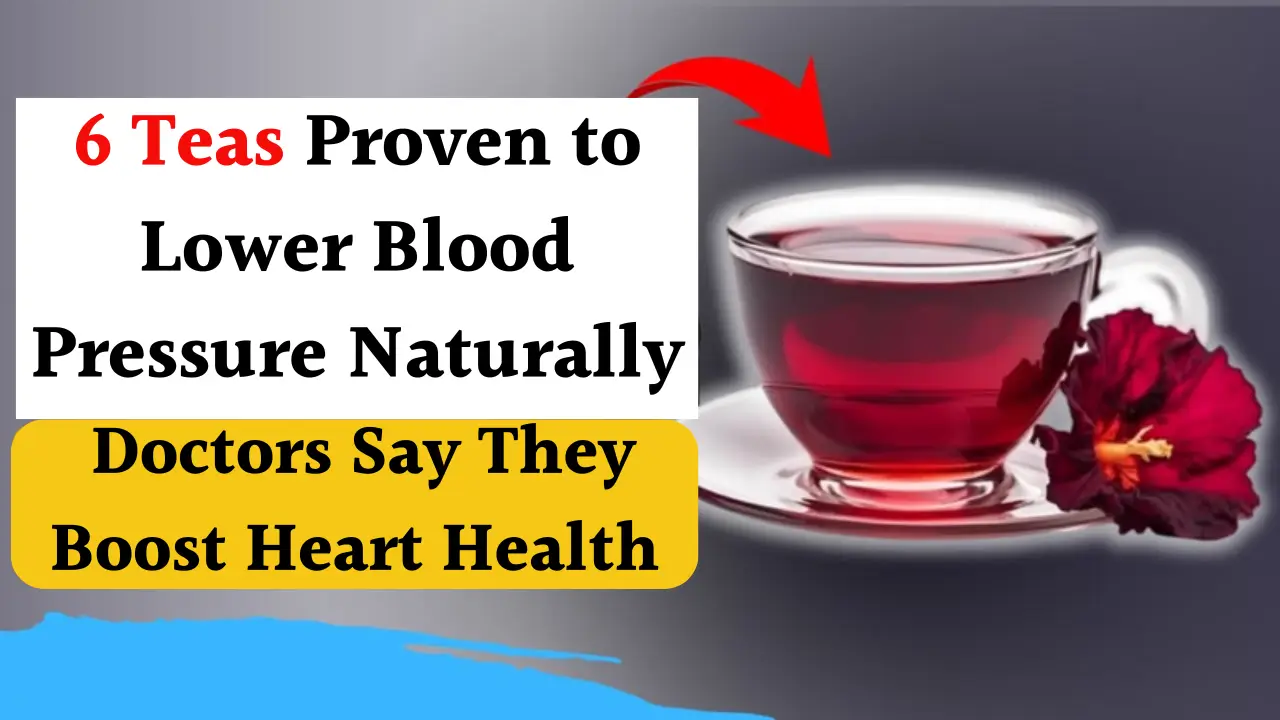In recent years, researchers and health experts have increasingly focused on simple, natural solutions that can positively influence cardiovascular well-being. Among these, tea has emerged as a powerful ally. Whether enjoyed as a calming morning ritual or as a soothing evening drink, certain teas are packed with antioxidants, flavonoids, and other bioactive compounds known to influence blood pressure and heart function.
For individuals aiming to improve circulation, reduce hypertension, and maintain overall vascular health, the right teas can be both preventive and therapeutic. This article will explore six teas that have been scientifically associated with lowering blood pressure and enhancing heart health. Each section will discuss their specific benefits, nutritional compounds, and role in cardiovascular care.
Why Tea Matters for Heart Health
Tea is more than just a comforting beverage. Scientific studies show that bioactive compounds in tea, especially flavonoids and catechins, help reduce oxidative stress, regulate cholesterol, and strengthen vascular walls. High blood pressure, or hypertension, is a leading risk factor for stroke, heart failure, and coronary artery disease. By drinking certain teas regularly, people can naturally manage blood pressure and reduce associated risks.
Unlike pharmaceutical interventions, teas carry minimal side effects while also promoting relaxation—important for individuals whose hypertension is aggravated by stress. Beyond blood pressure management, teas also improve endothelial function, which ensures optimal blood flow.
The 6 Best Teas for Lowering Blood Pressure
Here are six teas with proven benefits for reducing blood pressure and strengthening heart health:
Green Tea and Blood Pressure Support
Green tea has long been associated with cardiovascular benefits. Rich in catechins, particularly epigallocatechin gallate (EGCG), it enhances arterial flexibility and reduces oxidative stress. Studies have shown consistent consumption of green tea lowers both systolic and diastolic blood pressure.
Green tea also assists in lowering LDL cholesterol and improving HDL levels, making it an excellent heart-protective beverage. Its mild caffeine content can boost alertness but is gentler compared to black tea or coffee.
Hibiscus Tea for Natural Hypertension Control
Hibiscus tea is perhaps one of the most researched herbal teas for lowering blood pressure. Its anthocyanins act as natural vasodilators, relaxing blood vessels and promoting smoother blood circulation. Clinical trials show that regular consumption of hibiscus tea can lower systolic blood pressure by an average of 7–10 mmHg in hypertensive individuals.
The tart, berry-like flavour also makes hibiscus tea a refreshing alternative to sugary drinks, contributing to weight management, an important factor for cardiovascular health.
Rooibos Tea and Circulatory Health
Rooibos, native to South Africa, is rich in aspalathin, an antioxidant unique to this tea. It is naturally caffeine-free, making it suitable for individuals seeking a calming drink that won’t interfere with sleep. Rooibos helps reduce oxidative stress and inflammation, two contributing factors to high blood pressure.
Evidence also suggests rooibos may balance angiotensin-converting enzyme (ACE) activity, which plays a central role in regulating blood pressure. With its smooth, earthy taste, rooibos is an excellent choice for daily cardiovascular support.
Oolong Tea for Balanced Heart Function
Oolong tea sits between green and black tea, both in oxidation and taste. It carries polyphenols known to improve vascular health, metabolism, and lipid regulation. Regular oolong consumption is linked with reduced risk of cardiovascular disease. It also plays a role in weight management, which directly impacts blood pressure regulation.
The partial fermentation of oolong provides both the antioxidant strength of green tea and the soothing qualities of black tea, making it a balanced option for those seeking long-term heart health benefits.
Chamomile Tea and Stress-Induced Hypertension
While chamomile is often consumed for relaxation, its cardiovascular advantages are often overlooked. Chamomile promotes vasodilation, reduces inflammation, and assists in lowering stress-related cortisol levels, all beneficial for individuals whose hypertension is exacerbated by chronic stress or anxiety.
Though mild in flavour, chamomile’s calming properties contribute indirectly to heart health by easing tension in the nervous system and promoting quality sleep—both essential for maintaining steady blood pressure.
Black Tea and Arterial Flexibility
Black tea, one of the most consumed teas worldwide, contains flavonoids beneficial for blood circulation and arterial elasticity. Several studies show improved endothelial function in individuals consuming black tea daily. While it contains more caffeine compared to green or herbal teas, moderate consumption is linked with reduced risk of heart disease.
The key lies in consistent, moderate use. Too much caffeine can potentially affect sensitive individuals, but when consumed thoughtfully, black tea has strong protective effects against hypertension.
Nutritional Compounds Supporting Cardiovascular Health
Teas are filled with unique compounds that contribute directly to blood pressure control and vascular protection. Here is a comparison:
| Tea Type | Key Compounds | Primary Cardiovascular Benefit | Caffeine Content | Best for |
|---|---|---|---|---|
| Green Tea | Catechins (EGCG) | Lowers blood pressure, improves cholesterol | Low to moderate | Daily antioxidant support |
| Hibiscus Tea | Anthocyanins | Reduces systolic BP, natural vasodilator | Caffeine-free | Hypertension management |
| Rooibos Tea | Aspalathin, flavonoids | Reduces ACE activity, anti-inflammatory | Caffeine-free | Relaxation and circulation |
| Oolong Tea | Polyphenols | Balances lipids, improves vascular health | Moderate | Long-term cardiovascular health |
| Chamomile Tea | Apigenin, antioxidants | Stress relief, improved sleep, vasodilation | Caffeine-free | Stress-induced hypertension |
| Black Tea | Flavonoids, theaflavins | Improves endothelial function, arterial health | Moderate to high | General heart protection |
How to Incorporate Heart-Healthy Teas Daily
To gain full benefits, tea should be integrated into a balanced lifestyle. One to three cups per day of the above-mentioned teas is generally recommended, though individual tolerance to caffeine should be considered. For instance, those sensitive to caffeine may prefer hibiscus, rooibos, or chamomile in the evening while enjoying green or black tea in the morning.
Adding lemon or honey can enhance flavour without compromising health benefits. However, adding excessive sugar should be avoided, as high sugar intake cancels out the cardiovascular benefits.
Lifestyle choices such as maintaining a balanced diet, regular exercise, and stress management should work hand in hand with tea consumption for maximum results.
FAQs
1. Which tea is the most effective for lowering blood pressure?
Hibiscus tea shows the most consistent clinical evidence for reducing blood pressure, though green and rooibos are also highly beneficial.
2. Can I drink more than one type of tea daily?
Yes, combining different teas such as green in the morning and chamomile in the evening can provide balanced cardiovascular support.
3. Is tea alone enough to treat hypertension?
No, tea should be seen as complementary. A balanced diet, exercise, and medical advice are crucial for long-term management.
4. How long does it take to see results from drinking tea?
Regular consumption over several weeks is often necessary before measurable improvements in blood pressure are observed.
5. Are there any side effects of drinking tea for heart health?
Generally, teas are safe. However, those sensitive to caffeine should monitor their intake. Herbal teas like hibiscus may interact with certain medications, so consulting a doctor is recommended.
Conclusion
The power of natural teas in lowering blood pressure and protecting heart health is undeniable. From the catechins in green tea to the anthocyanins in hibiscus and the unique antioxidants in rooibos, each tea delivers a distinctive health-promoting profile. Making tea a daily ritual can serve as an effective, natural complement to a healthy lifestyle and medical care where required.






